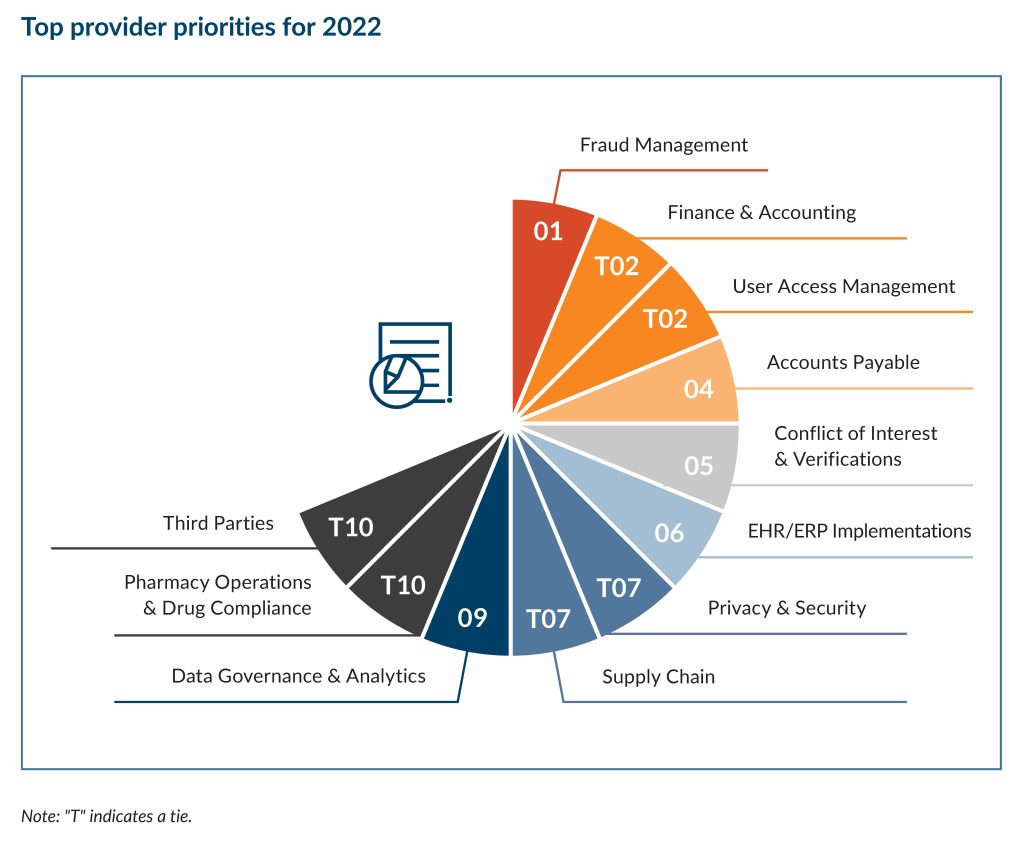The COVID-19 pandemic isn’t over yet, but recent data from the World Health Organization suggests the end may finally be in sight. Another sign that the pandemic is easing comes from the 2022 Healthcare Internal Audit Plan Priorities Survey, conducted by Protiviti and the Association of Healthcare Internal Auditors (AHIA). Our research indicates that a growing number of healthcare provider organizations are finding more time and flexibility these days to focus on positioning for a post-pandemic future.
This is a positive development for healthcare providers after two-plus years of near-constant pivoting amid an epic public health emergency. But it doesn’t mean these organizations can slip back into business as usual anytime soon — if such an option even exists anymore for the healthcare industry.
For one, healthcare providers still need to work through challenges that were disrupting their operations and undermining profitability long before the pandemic hit. Intensifying regulatory demands, the fight against opioid and substance use disorders, and skilled labor shortages are top among these issues. We also see many providers aiming to devote more resources to tackling a long list of what we refer to as the “new basics” in our report about the 2022 survey. These fundamental activities include:
- Addressing the residual impacts of the pandemic on core healthcare functions, including back-office operations such as billing and accounts receivable management
- Prioritizing revenue integrity initiatives to reduce the risk of revenue leakage — and improving revenue cycle processes
- Building on the successes of pandemic-driven innovation and transformation initiatives to increase future resiliency and efficiency and create competitive advantage
That to-do list is ambitious enough. However, our research for the latest Healthcare Internal Audit Plan Priorities Survey finds that healthcare provider organizations and their internal audit teams are also squarely focused on reducing risks related to data, including data governance and security, third parties (e.g., vendors, suppliers, contractors), and fraud. All three risk areas are included among the top 10 internal audit plan priorities for these organizations this year.

Containing Rampant Fraud Tops List of Audit Priorities for Healthcare Providers
Fraud management is the number one audit priority cited by healthcare provider respondents to the 2022 Healthcare Internal Audit Plan Priorities Survey. This finding reflects the heavy pressure that healthcare organizations are under to improve their ability to identify and defend against various fraud schemes that the pandemic has either introduced or helped to escalate. Telehealth-related fraud and bad actors utilizing “good actor” providers to carry out scams are just two examples of this activity.
Another top audit priority is user access management. (This priority ranks second in our survey, along with finance and accounting-related challenges, such as ineffective processes contributing to revenue leakage.) Healthcare organizations, like many businesses, have seen high turnover during the Great Resignation. They also rely heavily on the use of contractors, consultants and other temporary workers to fill skills gaps and staff projects. Identity and access management teams, many of which are also understaffed, are overwhelmed by user access changes. User access reviews are not being performed consistently, resulting in unauthorized individuals retaining system access longer than necessary.
It’s worth noting that fraud management and user access management relate, directly or indirectly, to helping to ensure privacy and security — which is another top 10 audit priority cited by healthcare provider respondents in this year’s survey. Organizations are looking to their internal audit teams to help them assess and monitor challenges impacting their information security and evaluate incident response plans, among other tasks.
Few Internal Audit Organizations in Healthcare Implementing Enabling Technologies
There is a significant opportunity for many healthcare provider organizations’ plans to have their internal audit teams focus on addressing these and other diverse and complex challenges so that the business can emerge from the pandemic stronger. More could be invested in their internal audit functions, especially when it comes to equipping them with modern technological capabilities.
Take advanced analytics: According to the 2022 Healthcare Internal Audit Plan Priorities Survey, only 27% of internal audit functions in healthcare have already implemented or are optimizing this capability. And only about one-fifth (21%) report that they’re currently implementing it. Given how vital it is for auditors to have access to advanced analytics to help the organization identify instances of fraud, it’s hard to see how they can truly address this top stated priority for internal audit this year.
Also, we learned from this year’s survey that very few internal audit departments in the healthcare industry are implementing enabling technology components like machine learning, artificial intelligence, process mining and automation. We note in our survey report that these findings aren’t surprising given that these technologies are expensive to implement and unfamiliar territory for many internal audit functions. But we also underscore the critical role these emerging technologies can play in helping internal audit to assess risks, improve audit quality, create dynamic and meaningful reporting, and increase the efficiency and effectiveness of audit work. They are also critical to driving internal audit innovation and transformation.
Healthcare provider organizations are relying more than ever on their internal audit functions to help them increase overall business agility and resiliency so they can recover from pandemic-related disruption and seize new opportunities in a changed world. However, these departments can’t be expected to meet that tall order if they don’t have ample resources. That includes advanced technological capabilities and highly skilled and engaged teams that will allow them to evolve into next-generation functions capable of supporting future-focused healthcare organizations.
For more findings and analysis from Protiviti and AHIA’s 2022 Healthcare Internal Audit Plan Priorities Survey, including the full lists of internal audit priorities for healthcare providers and payers, download our free survey report here. Our report also features an overview of the governance structures, methodologies and enabling technologies that internal audit organizations in the healthcare industry will want to consider adopting as they work to transform into next-gen functions.






